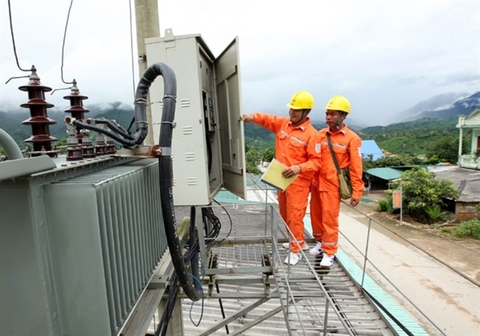
Workers from the Lai Chau Power Company check power transmission lines in Nam Nhun District. — VNA/VNS Photo Ngoc Ha
The successful equitisation and capital divestment of State-owned enterprises (SOEs) would create benefits that boosted the stock market and business performance, experts have said.
According to analysts from brokerage firm Yuanta Securities Vietnam, State capital divestment from unlisted enterprises that transferred governance to private units would help simplify the listing process.
“If the stock market is for both buyers and sellers, we have to promote the development of both sides,” experts from Yuanta said.
Regarding the sellers, the greater the number of businesses participating in the market, the larger the market size would become, they said.
Investors, as a result, would have more options. Equitisation and divestment of SOEs would give the market more stocks with good asset quality and large capitalisation scale, thus drawing more investors which would improve market liquidity, they said.
From 2007-08 and 2015-16, when divestment and equitisation was promoted by the Government, the average stock market liquidity in 2009 skyrocketed by 226 per cent compared to 2008, reaching VND1.6 trillion per session. Nearly 10 years later, in 2018, liquidity reached VND5.25 trillion per session.
At present, the foreign ownership ratio in existing stocks is almost fully occupied. If there are no more attractive new investment opportunities, foreign cash flow pouring into the market will gradually narrow.
According to Do Bao Ngoc, Deputy General Director of Viet Nam Construction Securities Joint Stock Company, the promotion of divestment and equitisation would make it feasible for Vietnamese stock markets to upgrade to an emerging market level from the current frontier market classification.
“The scale of the market will be expanded with increases both in the number of listed companies and market capitalisation,” Ngoc said.
“For businesses, they will gain more trust among investors with more transparency in corporate governance, shareholder diversification and larger involvement of strategic shareholders,” he said.
“The capital collected through divestment would also help the Government nurture public investment, thereby boosting the economy and creating a favourable environment for businesses to develop.”
Obstacles remain
Ngoc said the divestment plan for 2017-20 had not been reached for various reasons.
“Divesting from all the 92 SOEs targeted in 2020 seems to be an impossible task and requires more detailed plans for the latter stages of the divestment process,” he said.
“Divestment at small and medium-sized enterprises often draw little attention from investors. In many cases, when the State offers a share auction, no single investor registers to participate as they tend to place higher concern on large-scale enterprises with effective operations, but this group only accounts for a small amount,” Bao said.
According to Le Duc Khanh, director of the market strategy department at PetroVietnam Securities (PSI), in 2020, the divestment process could stall as the stock market had been negatively affected by diseases and economic decelerations, with GDP forecast to decline.
“It might not be until the beginning of 2021, but the divestment process could accelerate when the stock market starts to recover,” the expert said.
In some cases, the Government needs to approve divestment plans based on actual market demand. Therefore, the stages of supervision and approval need to be careful and transparent, Ngoc said.
From 2016 - 2019, only 36 out of 128 enterprises were equitised, meeting 28 per cent of the plan,
The remaining 92 firms have been instructed to get moving in 2020. — VNS